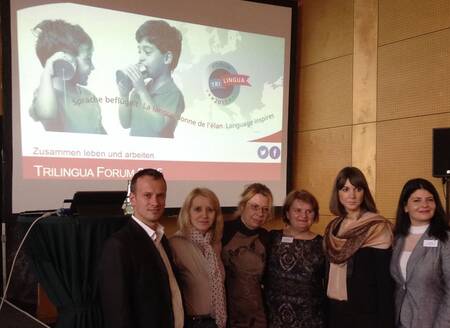 Waiting at airports can be a real nuisance. However, for a group of teachers from six different schools from South Eastern Europe, being stuck at Frankfurt airport on the way to Trier, Germany, turned out to be an insightful experience.
Waiting at airports can be a real nuisance. However, for a group of teachers from six different schools from South Eastern Europe, being stuck at Frankfurt airport on the way to Trier, Germany, turned out to be an insightful experience.
While waiting, Dorina Murati, an English teacher at the "Beqir Cela" vocational high school in Albania was constantly on her phone, talking with her school principal and co-ordinating the completion of a project proposal that the school was due to submit that day. All the teachers jumped in to assist and the tiresome waiting experience turned into a truly unselfish brainstorming session that resulted in the successful completion of the project proposal.
“We had been experiencing some problems and we were not been able to finish it on time. So we had to finish it while I was travelling, via telephone and Viber. We were stuck on the title. Discussing this with the other colleagues also waiting at the airport, we came up with a very catchy title “ABC You and me - Together in literacy”. It was really fun, as later on we discussed a lot more aspects of the project. I wrote all the suggestions that they had and my colleagues back in Albania put them down in the project proposal itself”, says Murati.
For Murati, this was a unique experience. She had to prepare the project proposal for a partnership between her school and a school from Austria and would have never guessed that it would be literally completed while waiting at an airport.
“I really hope this project will take off successfully”, she says.
Dorina is one of six teachers coming from six different schools from SEE that participated at the Trilingua Forum that was held in Trier on 15-18 April 2015. The goal of the Forum was to give educational experts of the Greater Region and other European countries an opportunity to exchange and discuss innovative pedagogical approaches. Its programme included workshops on some quite contemporary aspects of the teaching profession, including the importance of language in the inclusion process and the use of digital media as a resource for teacher development.
“In my opinion, the most impressive workshop was “Language as the key to inclusion”. As a language teacher myself, I was really eager to see what has been done and what can be done in inclusive practices of language learning. I was very surprised to learn that foreign language teachers from so many countries share the same problems and dilemmas about teaching children with special education needs”, says Andreja Škarica, from the Economic and Management School in Osijek, Croatia.
She, Dorina and the rest of the teachers present at the Forum had a chance to participate in a number of different workshops during the forum, including sessions on language promotion, e-Twining, cross-border work placements and career planning.
“Sharing ideas in such a multicultural environment, like the experience we also had at Frankfurt airport, is very exciting, productive and worthwhile. However, it is not always easy to meet in person. A possible solution to the problem was given to us by one of the Trilingua workshops I attended: “e-Twinning - the community for schools in Europe. It is a web platform that enables people to communicate with partners from other countries in real time”, says Škarica.
Škarica, Murati and the rest of the group of six teachers come from SEE pilot schools of the Joint EU/CoE Project “Regional Support for Inclusive Education”, who facilitated their participation on the Trier educational Forum.








